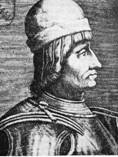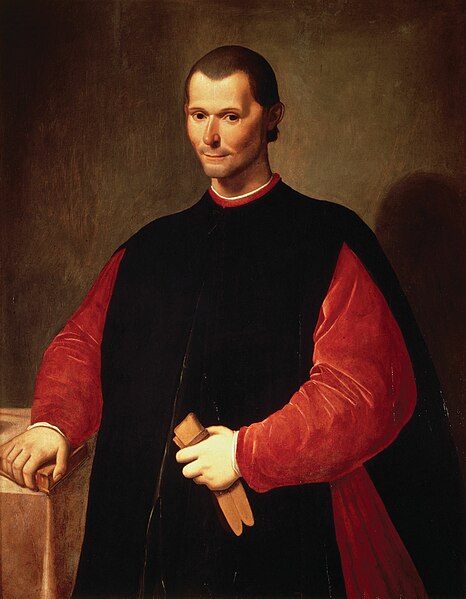 |
| Caterina Sforza |
During
Caterina’s mad rampage through her son’s domains, Ottaviano and Cesare, afraid
of their mother’s anger, had remained in the safety of the house of Raoul
Denti, one of Forli’s nobility. Seven years before he’d refused to hand over
Girolamo’s children to the mob after Girolamo had been killed. Hiding in
Denti’s house, Ottaviano had not attended his stepfather’s funeral making him
suspect in his mother’s eyes.
Now
Caterina’s anger was focussed on her son who she knew had resented Giacomo’s
usurpation of Ottaviano’s authority. Ottaviano was summonsed to appear before
his mother in his own fortress of Ravaldino, he was escorted there by
Caterina’s soldiers. An angry crowd followed their lord to Ravaldino where they
were met by cannon fire. Ottaviano was left to face his mother’s ire alone.
Ottaviano
was placed under house arrest and his half-brother Scipione Riario, who had
objected to the violence of his stepmother’s reactions, was locked in a dungeon
for eighteen months. The reprisals continued, with the mistress of one of the
conspirators and her children being murdered. The second priest involved in the
conspiracy was burnt over hot coals before being beheaded.
Horror and
disgust of Caterina’s actions was to be found the length and breadth of the
Italian peninsula. Her name was vilified; thirty eight people had been killed
and numerous others tortured, imprisoned or exiled. Even the pope, Ludovico
Sforza and the Signoria of Florence all recoiled at what Alexander claimed was
the;
‘Unheard of bloodthirstiness
committed to satisfy her passions.’[i]
Caterina
remained in Forli mourning her beloved throughout the following winter, only
rousing herself in November 1495 to engage in an alliance against Count Guido
of Gaggiolo who had taken a number of towns from the Archbishop of Ravenna. Guido was killed during the
fighting and Caterina’s prize for her soldiers involvement in the campaign was
the town of Castrocaro. Venice objected strongly to this
transfer and Caterina’s Uncle Ludovico advised her to return the town to the
archbishop, which she duly did.
Rebuilding a Life
That winter
was exceptionally hard and the province was facing a famine; not only the cold
but the troops had ruined the previous summer’s crops as they marched across
the fields. To avoid wide-scale starvation among her people Caterina was forced
to buy in large quantities of grain. Four to five hundred pounds of flour per
day were distributed to the poor of Forli from February to June[ii].
Caterina had
the palazzo where she had lived with Giacomo torn down; Caterina moved into the
fortess of Ravaldino, the better to protect herself. She turned part of the
fortress into a luxurious home, building a palazzo abreast of the keep. The
remains of the old house were used for new building projects. The fortress
itself was upgraded and repaired.
 |
| Giovanni Bentivoglio |
Caterina
decided to arrange a marriage for Ottaviano and her eye fell upon Isotta
Bentivoglio, daughter of Giovanni Bentivoglio of Bologna. Isotta declared that she
was going to become a nun. Caterina considered the refusal a betrayal; she
already knew that a number of those implicated in Giacomo’s death had taken
refuge with the Bentivoglio. She sent assassins to Bologna in a failed mission
to kill one of her bitterest enemies, much to her uncle’s irritation. Caterina
confessed to him;
‘I have been gravely
wronged, and I still want to get my hands on him, to further thwart those who
would conspire against me….I confess, I did not do a good thing, as you said.’[iii]
Instead of
looking around for an alternative bride for her son, Caterina decided Ottaviano
needed to gain military experience and she asked her uncle to arrange for this.
Instead Ludovico suggested that Ottaviano marry one of the Marquis of Mantua’s
daughters. Caterina refused to consider the idea. By 1497 Ottaviano already had
one illegitimate daughter by the daughter of a carpenter even as his mother
continued to refuse an offer from the de’ Medici and a renewal of the Mantua
offer.
Looking Out For the Kids
 |
| Niccolo Machiavelli |
Caterina now
sought out benefices for Cesare; she had fallen out with Cardinal Raffaello
Riario, believing that he had encouraged Giacomo’s assassins. In the summer of
1496 as Raffaello lay seriously ill Caterina persuaded her uncle to transfer
all the benefices that Raffaello held in Milan to Cesare once his second cousin
died.
The
Venetians were sending raids into Ottaviano’s lands with increasing regularity.
Like many of his neighbours Ludovico Sforza was unwilling to offend Venice or
help Caterina defend Forli and Imola and so Caterina raised an army of 8,000
troops to defend her son’s heritage. Caterina looked to Florence, the only
other regional power willing to oppose la
Serenissima, for an ally.
 |
| Fra Savonarola |
Giovanni was
wealthy, thirty and attractive; an able conversationalist he talked to Caterina
about art and literature. Like Caterina Giovanni was interested in botanical
experiments and he also got on well with all her children, including Ottaviano.
Before long
Giovanni was lodged in Giacomo’s former apartments, in Rivaldino, with his own
household. When Caterina fell ill in the autumn Giovanni paid Caterina daily
visits in her private apartments. Ludovico Sforza was informed that Caterina had
been seen caressing Giovanni and that she might marry to ‘satisfy her
appetites.’ She made haste to inform her uncle that;
‘I am no longer at that age
when others should think that these youthful appetites reign in me; foremost in
my mind is my duty to govern these states.’[vi]
Whether she
assuaged her uncle’s fears is not known but he cannot have been pleased to
receive a letter in January 1497 from his ambassador informing Ludovico that
Giovanni and Caterina were married. Caterina denied the marriage until she
found herself pregnant in the summer. Pro-French Florence and Ludovico Sforza,
a member of the Holy League[vii] were on opposing sides and Caterina
was loath to make an enemy out of a family member.
Bibliography
At the Court
of the Borgia – Johann Burchard, the Folio Society 1990
Italian
Dynasties – Edward Burman, Equation 1989
The Deadly
Sisterhood – Leonie Frieda, Harper Collins 2013
Florence and
the Medici – JR Hale, Phoenix Press 2004
The Rise and
Fall of the Medici – Christopher Hibbert, Folio Society 2001
The Borgias
– Mary Hollingsworth, Quercus Editions Ltd 2014
Tigress of
Forli – Elizabeth Lev, Head of Zeus Ltd, 2012
The Borgias
– GJ Meyer, Bantam Books 2013
Absolute
Monarchs – John Julius Norwich, Random House 2011
Niccolo’s
Smile – Maurizio Viroli, IB Tauris & Co Ltd 2001
www.wikipedia.en
[i]
Tigress of Forli - Lev
[iii]
Tigress of Forli
[iv]
In 2016 the relative: historic standard of
living
value of that income or wealth is £10,380,000.00, labour earnings of that income or wealth is
£101,800,000.00, economic status value of that income or wealth is £242,500,000.00, economic power value of that income or
wealth is £5,705,000,000.00 www.measuringworth.com
[v] In 2016 the
relative: historic standard of living value of that income or wealth is £7,219,000.00, labour earnings of that income or wealth is £59,030,000.00, economic status value of that income or wealth is £169,000,000.00, economic power value of that income or wealth is £3,958,000,000.00 www.measuringworth.com
[vi]
Tigress of Forli - Lev
[vii]
Also known as the League of Venice, whereby Milan, the papacy, Venice, the
Aragonese and the Holy Roman Emperor joined forces to force the French out of
Italy
No comments:
Post a Comment
Note: only a member of this blog may post a comment.